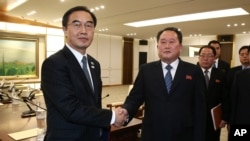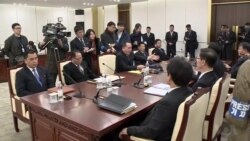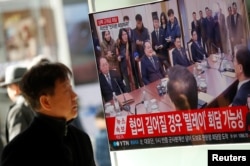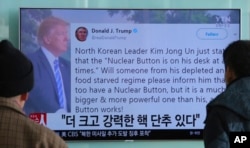The United States and United Nations on Tuesday welcomed steps to ease tensions between North and South Korea after the two rival states held their first face-to-face talks in two years.
Pyongyang and Seoul agreed to hold further military talks and North Korea announced it had reconnected a severed military hotline with the South and would send a delegation of athletes, high-level government officials and a cheering squad to the Winter Olympics next month in Pyeongchang, South Korea.
The announcements, made at Panmunjom, which straddles the Koreas, represent a possible reduction in severely escalating tensions surrounding North Korea's nuclear and ballistic missile programs.
"North Korean participation is an opportunity for the regime to see the value of ending its international isolation by denuclearizing," according to a spokesperson for the White House National Security Council.
WATCH: Korea talks
Later in the day, White House press secretary Sarah Huckabee Sanders said "the next steps would be denuclearization of the Korean Peninsula," calling that "our number one priority and certainly what we would like to see."
"We are encouraged that North Korea has agreed to send athletes and other supporters to the South Korean games," Steve Goldstein, undersecretary of state for public diplomacy and public affairs, told reporters. "We would like nuclear talks to occur. We want denuclearization of the Korean Peninsula.This is a good first step in that process."
The United States will also send a "high-level delegation" to the Olympic Games, the NSC spokesperson said.
When asked to comment about the possibility of direct contacts at the sporting event between officials and delegations from Washington and Pyongyang, Goldstein said: "That's not planned currently, but we'll see how this progresses."
"Officials from our administration have been in touch with the South Korean side" following Tuesday's discussion between Seoul and Pyongyang, Sanders said in response to a question at Tuesday's daily briefing on whether South Korean President Moon Jae-in had briefed U.S. President Donald Trump on the talks.
Those U.S. and South Korean officials will "ensure North Korean participation in the Winter Olympics does not violate the sanctions imposed by the U.N. Security Council over North Korea's unlawful nuclear and ballistic missile programs," according to the NSC.
Diplomats at the State Department are taking some of the credit for getting Pyongyang and Seoul to sit together for the first time in 25 months.
"We believe that our pressure campaign could be what brought North Korea to start talking with the South," Brian Hook, Secretary of State Rex Tillerson's senior policy adviser, told reporters.
Tillerson is to head to Vancouver next Monday for a Sending States Ministerial meeting, co-hosted Canada and the United States, to assess the pressure campaign "and to see how we can further boost its effectiveness," Hook said.
The re-establishment of the military hotline between the two sides is "critical to lowering the risk of miscalculation or misunderstanding and to reduce tensions in the region," according to a statement from Stephane Dujarric, spokesman for U.N. Secretary-General António Guterres.
The U.N. spokesman said he hoped "such engagement and efforts will contribute to the resumption of sincere dialogue leading to sustainable peace and denuclearization on the Korean Peninsula."
It was not clear, however, whether the talks would lead to meaningful change.
Trump has, at various times, called talks with Pyongyang useless and threatened to "totally destroy" North Korea if it does not heed U.S. warnings.
"North Korea has a foul intent here. What they're trying to do is essentially buy time," said Harry Kazianis, director of defense studies at the Center for the National Interest, a public policy think tank in Washington.
"They're very, very close to actually developing a nuclear weapon that could hit the United States homeland," Kazianis told VOA.
A hawkish former U.S. ambassador to the United Nations, John Bolton, said the talks could be a "propaganda stunt" by the North.
Many Trump administration officials have said they are determined to resolve the standoff via diplomacy or economic sanctions, but recent media reports suggest U.S. officials are also discussing limited strikes on the North.
Abraham Denmark, a former U.S. deputy assistant secretary of defense for East Asia, warned against such a so-called "bloody nose" strike, arguing that it risked igniting a full-blown war on the Korean Peninsula.
Denmark, now the Asia program director at the Wilson Center, a global policy research forum in Washington, told VOA that "while I certainly can't speak for them, I think the chances that the United States will attack North Korea sometime in 2018 are 50/50."
"A lot will depend on North Korea's behavior," he added.
The North Koreans last year carried out their sixth and most powerful nuclear test, and they have regularly tested ballistic missiles. But they are thought to still be perfecting the critical technology needed to protect an intercontinental ballistic missile upon re-entry into Earth's atmosphere.
VOA's Peter Heinlein, Bill Gallo and Nike Ching contributed to this report.










